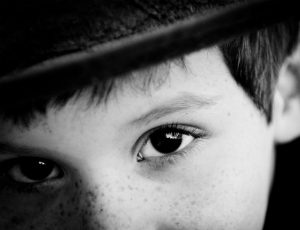Anthony Jacques is in only two episodes of Atypical, the Netflix series about a high school student with autism. But it's in Jacques' scenes that the show really comes alive. There's a crackling energy in the young actor's performance as Christopher, who calls the main character a snoozefest before the two teenagers hilariously discover some common ground: girls and sex.
Like the character he plays, 24-year-old Jacques identifies as autistic—or on the autism spectrum.
People with autism spectrum disorder have a wide range of symptoms, but it affects how they communicate, behave, interact with others and learn. His performance and backstory made me curious about how people with autism experience the world. Fortunately, there are two exceptionally fine documentaries about life on the spectrum.
"Every kid in the pool is different," says Mike McQuay in POV/Swim Team, an apt reminder that no two people on the spectrum are alike. The coach of the Jersey Hammerheads, McQuay and his wife started the swim team for his son, Mikey, and other young people with autism. In this moving and beautifully crafted documentary, we get to know three very different young men—their struggles, their successes, their aspirations—as they move toward the Special Olympics state finals.
For Mikey, a lanky, gentle high school student who loves animals and knows he’s “different than other kids,” the pool is where he feels "normal." For his younger teammate, Robbie, a charmer who trains for hours and gives motivational talks to the others, swimming offers camaraderie and a challenge. For the endearing and unforgettable Kelvin, his pleasure in swimming is complicated by self-consciousness: Kelvin also has Tourette syndrome—and people sometimes stare when his vocal and physical tics flare up. The expressiveness and kindness of Kelvin’s face, though he isn’t always on the receiving end of kindness, stayed with me long after the film.
In the Oscar nominated Life, Animated, 23-year-old Owen Suskind moves away from home and into an assisted-living apartment, writes and gives a brief speech on autism at a conference, and hosts meetings of a Disney club he started “to get to know more people…and be more popular. And guess what? It worked!”
At 3, Owen started to lose motor skills, his speech became garbled and he was diagnosed with autism. He still loved to watch animated Disney movies, though, and several years after his diagnosis, his father got Owen to talk to him when he spoke to Owen as Iago from Aladdin, Iago puppet in hand.
“It was like a window opened,” says his father, a Pulitzer Prize-winning journalist whose book about Owen, Life, Animated, led to this inspiring film of the same name. In it, we witness not only Owen’s current daily life, but interviews with him about how he experienced the world as a child, home video footage of him as a boy, plus animation of his life and clips from his adored Disney films.
I loved this story, and the empathy of Owen, who as a bullied teenager filled a sketchbook with drawings of Disney sidekicks, after which he wrote: “I am protector of the sidekicks. No sidekick gets left behind.” Owen explains that he didn't feel like a hero during that difficult time. He felt like a sidekick.
In this film, he is both.




Add a comment to: Great Documentaries: Life on the Autism Spectrum